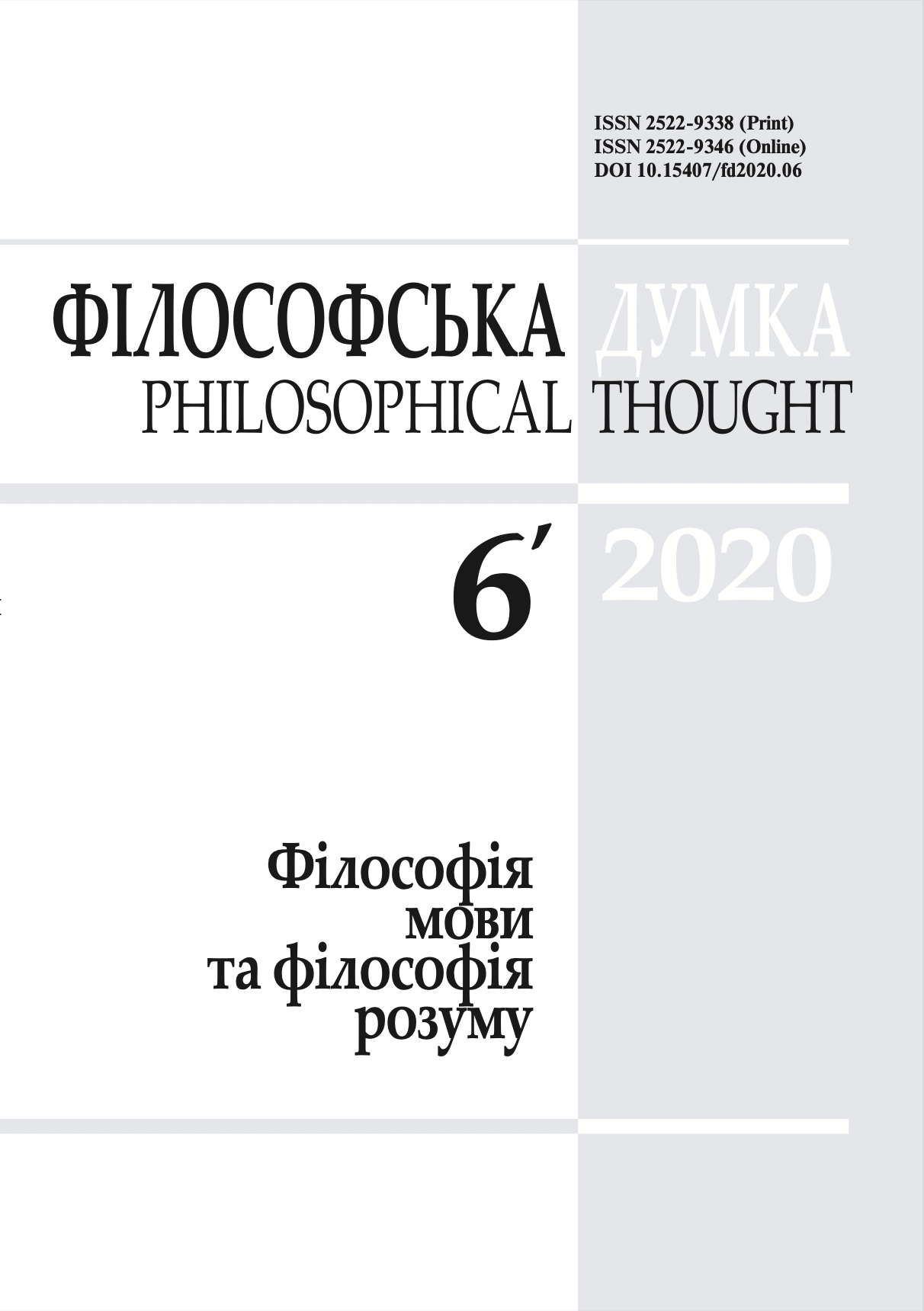Being Sceptical about Kripkean A Posteriori Necessities and Natural Kinds
MEANING, REFERENCE, AND MODAL EPISTEMOLOGY
DOI:
https://doi.org/10.15407/fd2020.06.098Keywords:
a posteriori necessary truth, necessity, contingency, metaphysical possibility, natural kindAbstract
The article discusses Saul Kripke’s influential theories of a posteriori necessary truths and natural kinds. With respect to the statements of identity involving proper names, it is argued that although their truth is a posteriori and necessary in the specific sense of counterfactual invariance, this is of no significance for substantial philosophical issues beyond the philosophy of language, because this counterfactual invariance is a trivial consequence of the use of proper names as rigid designators. The case is made that the expansion of the realm of necessary a posteriori truths to the statements of theoretical identity that involve “natural kind terms”, as well as the Kripkean essentialist theory of natural kinds, have no weighty argumentative support and fit badly both with science and language practice. This sets the stage for the development of an appropriately sophisticated “descriptivist” ac- count of meaning and reference that would be better suited for a widened range of Kripke-Putnam style thought experiments. The general outlines of such a descriptivist account are provided.
References
Atran, S. (1990). Cognitive Foundations of Natural History: Towards an Anthropology of Science. Cambridge: Cambridge University Press.
Atran, S. (1998). Folk Biology and the Anthropology of Science: Cognitive Universals and Cul- tural Particulars. Behavioral and Brain Sciences, 21, 547-569.
https://doi.org/10.1017/S0140525X98001277
PMid:10097021
Ayer, A. J. (1983). Philosophy in the Twentieth Century. New York: Vintage Book.
Bird, A., Tobin E. (2017). Natural Kinds. Stanford Encyclopedia of Philosophy. Retrieved from: https://plato.stanford.edu/entries/natural-kinds/
https://doi.org/10.1093/obo/9780195396577-0322
Brzović, Z. (2018). Natural Kinds. The Internet Encyclopedia of Philosophy. Retrieved from: https://www.iep.utm.edu/nat-kind/
Chalmers, D. (1996). The Conscious Mind. Oxford: Oxford University Press.
Chalmers, D. (1997). Moving Forward on the Problem of Consciousness. Journal of Consciousness Studies, 4(1), 3-46.
Chalmers, D. (2002a). On Sense and Intension. Philosophical Perspectives, 16, 135-182.
https://doi.org/10.1111/1468-0068.36.s16.6
Chalmers, D. (2002b). The Components of Content. In: D. Chalmers (ed.), Philosophy of Mind: Classical and Contemporary Readings (pp. 608-633). Oxford: Oxford University Press. Chalmers, D. (2004). Epistemic Two-Dimensional Semantics. Philosophical Studies, 118, 153-226.
https://doi.org/10.1023/B:PHIL.0000019546.17135.e0
Chalmers, D. (2006). The Foundations of Two-Dimensional Semantics. In: M. Garcia-Carpintero and J. Macia (eds.), Two-Dimensional Semantics: Foundations and Applications (pp. 55-140). Oxford: Oxford University Press.
Chalmers, D. (2010). The Two-Dimensional Argument Against Materialism. In: Chalmers, D., The Character of Consciousness (pp. 141-205). Oxford: Oxford University Press.
https://doi.org/10.1093/acprof:oso/9780195311105.003.0006
Dupré, J. (1981). Natural Kinds and Biological Taxa. Philosophical Review, 90, 66-90.
https://doi.org/10.2307/2184373
Dupré, J. (1993). The Disorder of Things: Metaphysical Foundations of the Disunity of Science. Cambridge MA: Harvard University Press.
Dupré, J. (1996). Promiscuous Realism: A Reply to Wilson. British Journal for the Philosophy of Science, 47, 441-444.
https://doi.org/10.1093/bjps/47.3.441
Dupré, J. (2001). In Defence of Classification. Studies in History and Philosophy of Biological and Biomedical Sciences, 32, 203-219.
https://doi.org/10.1016/S1369-8486(01)00003-6
Evans, G. (1979). Reference and Contingency. The Monist, 62, 161-189.
https://doi.org/10.5840/monist197962220
Ereshefsky, M. (1992). Eliminative Pluralism. Philosophy of Science, 59, 671-690.
https://doi.org/10.1086/289701
Ereshefsky, M. (1998). Species Pluralism and Anti-Realism. Philosophy of Science, 65, 103-120
https://doi.org/10.1086/392628
Ereshefsky, M., Reydon, T. (2015). Scientific kinds. Philosophical Studies, 172(4), 969-986.
https://doi.org/10.1007/s11098-014-0301-4
Ereshefsky, M. (2017). Species. Stanford Encyclopedia of Philosophy. Retrieved from: https://plato.stanford.edu/entries/species/
Fitch, G. (1976). Are There Necessary "A Posteriori" Truths? Philosophical Studies, 30(4), 243-247.
https://doi.org/10.1007/BF00372496
Hacking, I. (2007). Natural Kinds: Rosy Dawn, Scholastic Twilight. Royal Institute of Philosophy Supplement, 61, 203-239.
https://doi.org/10.1017/S1358246100009802
Jackson, F. (1994). Armchair Metaphysics. In: M. Michael and J. O'Leary-Hawthorne (eds.), Meaning in Mind (pp. 23-2). Dordrecht: Kluwer Academic Publishers.
https://doi.org/10.1007/978-94-011-1008-2_3
Jackson, F. (1998a). From Metaphysics to Ethics: A Defence of Conceptual Analysis. Oxford: Ox- ford University Press.
Jackson, F. (1998b). Reference and Description Revisited. Philosophical Perspectives, 12, 201-218.
https://doi.org/10.1111/0029-4624.32.s12.9
Jackson, F. (2004). Why We Need A-Intensions. Philosophical Studies, 118, 257-277.
https://doi.org/10.1023/B:PHIL.0000019548.04704.69
Keil, F. C. (1979). Semantic and Conceptual Development: An Ontological Development. Cambridge, Mass.: Harvard University Press.
Keil, F. C. (1989). Concepts, Kinds and Cognitive Development. Cambridge, Mass.: MIT.
Kendig, C. and others (2015). Natural Kinds and Classification in Scientific Practice. Routledge.
https://doi.org/10.4324/9781315619934
Kipper, J. (2012). A Two-Dimensionalist Guide to Conceptual Analysis. Ontos Verlag.
https://doi.org/10.1515/9783110322705
Kitcher, P. (1984). Species. Philosophy of Science, 51, 308-333.
https://doi.org/10.1086/289182
Kripke, S. (1972). Naming and Necessity. In: Davidson, D. and Harman, G. (eds.), Semantics of Natural Language (pp. 253-355). Dordrecht: Reidel.
https://doi.org/10.1007/978-94-010-2557-7_9
LaPorte, J. (2004). Natural Kinds and Conceptual Change. Cambridge: Cambridge University Press.
https://doi.org/10.1017/CBO9780511527319
Mackie, P. (2002). Deep Contingency and Necessary A Posteriori Truth. Analysis, 62(3), 225-236.
https://doi.org/10.1093/analys/62.3.225
Plato (1892). Phaedrus. In: Jowett, B. (transl.), Dialigues of Plato. Vol. 1 (pp. 391-489). Oxford University Press.
Putnam, H. (1975). The Meaning of "Meaning". Minnesota Studies in the Philosophy of Science, 7, 131-193.
https://doi.org/10.1017/CBO9780511625251.014
Putnam, H. (1990). Is Water Necessarily H2O? In: Putnam, H., Realism with a Human Face (pp. 54-79). Harvard University Press.
Rosenberg, J. (1994). Beyond Formalism: Naming and Necessity for Human Beings. Philadelphia: Temple University Press.
Salmon, N. (1979). How Not to Derive Essentialism from the Theory of Reference. The Journal of Philosophy, 76(12), 703-725.
https://doi.org/10.2307/2025854
Salmon, N. (1986). Frege's Puzzle. Cambridge, MA: MIT Press.
Soames, S. (2002). Beyond Rigidity: The Unfinished Semantic Agenda of Naming and Necessity. Oxford: Oxford University Press.
https://doi.org/10.1093/0195145283.001.0001
Vasilyev, V. (2014). Consciousness and Things. [In Russian]. Moscow: Librocom.
Ziff, P. (1977). About Proper Names. Mind, 86(343), 319-332.
Downloads
-
PDF
Downloads: 286
Published
How to Cite
Issue
Section
License
Authors who publish with this journal agree to the following terms:
- Authors retain copyright and grant the journal right of first publication.
- Authors are able to enter into separate, additional contractual arrangements for the non-exclusive distribution of the journal's published version of the work (e.g., post it to an institutional repository or publish it in a book), with an acknowledgement of its initial publication in this journal.
- Authors are permitted and encouraged to post their work online (e.g., in institutional repositories or on their website) prior to and during the submission process, as it can lead to productive exchanges, as well as earlier and greater citation of published work (See The Effect of Open Access).


